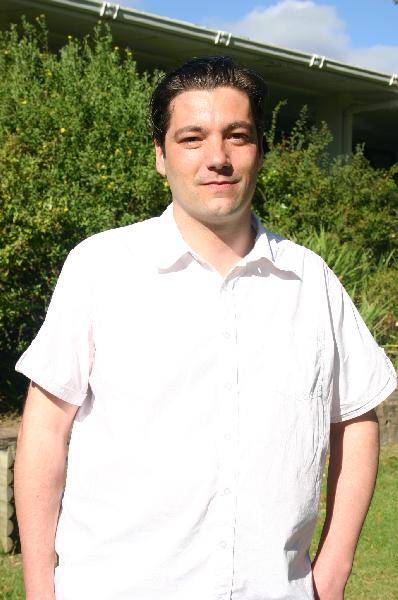
Dr Jude Przyborski, a University of Marburg (Germany) based scientist and a key collaborator with the Biomedical Biotechnology Research Unit (BioBRU) in their research involving the human malarial parasite Plasmodium falciparum visited Rhodes University to participate in the annual BioBRU retreat.
Dr Przyborski’s laboratory is a co-recipient of the prestigious research grant awarded to BioBRU by the German Research Foundation (DFG) German-African Cooperation Projects in Infectology Programme.
Jude was also able to spend time in the lab with Prof Greg Blatch, director of BioBRU, and other Rhodes researchers. He learnt some new techniques for investigating molecular chaperones and was able to share knowledge from his own areas of speciality. As his visit coincided with the end of SciFest, Dr Przyborski was invited to present a lecture as part of the ‘Frontiers of Science’ lecture series hosted by Rhodes.
His lecture, entitled: “Malaria: an ancient parasite in a modern world”, offered a broad historical overview of malaria in the global arena, as well as addressing some of the current social, economic and political factors which play a role in the ongoing and devastating impact of malaria, particularly in sub-Saharan Africa.
However, Przyborski emphasised that the situation is not devoid of hope. He maintains that the more we know about the disease, the more possible it becomes to discover ways of eradicating it.
The three-way sharing of information and expertise that has been facilitated by the DFG grant is taking each participating laboratory’s research to new levels, making theirs one of several strands of malaria research that are yielding hopeful new insights.
Dr Przyborski explains that malaria, which is caused by the Plasmodium parasite, has a complex life cycle alternating between a vertebrate and an invertebrate host. The parasite is capable of surviving within the red blood cells of humans.
“Plasmodium falciparum (the most dangerous strain of malaria) remodels the host red blood cell to ensure its own survival,” says Przyborski. It is this remodeling that makes malaria dangerous to humans as the cells become ‘sticky’ – infected cells ‘stick’ to the inside walls of blood vessels resulting in blockages.
BioBRU’s research, under Prof Blatch, together with the work of Dr Addmore Shonhai, now at the University of Zululand, has highlighted the role played by molecular chaperones (stress proteins) in ensuring the survival of the parasite within the blood cells.
With the input of Przyborski’s expertise in cell biology and the malaria parasite, their collaborative research has taken a step up and they are now investigating chemical compounds which will disable these ‘stress survival’ mechanisms in the parasite - the essential first step in drug discovery. So the research focus has shifted from understanding how these molecular chaperones work to discovering effective ways to intervene and disable the process of the disease.
The DFG grant will fund their work together for the next three years, but Przyborski says that does not mean they will stop working together thereafter. ‘The fit is perfect’, he explains and all three laboratories are working to secure further funding for ongoing collaboration.
In the short term however, there are several planned personnel exchanges between the laboratories to build capacity. And, that ultimate test of scientific endeavours, their first joint paper has been accepted and is due for publication shortly. “The first of many, we hope”, says Dr Przyborski with a smile.
Pic: Dr Jude Przyborski
